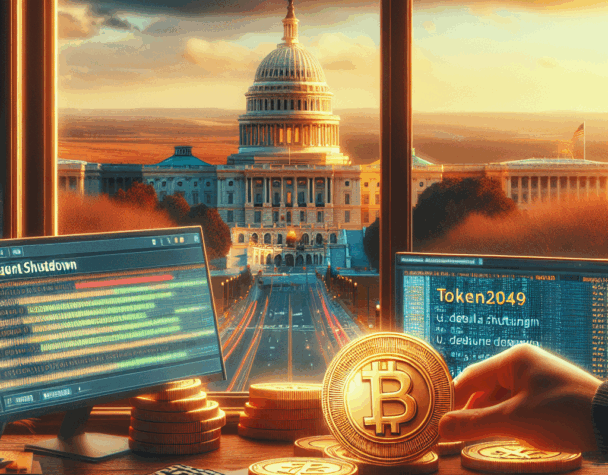
US Shutdown Halts Jobs Data; TOKEN2049 Sanctions
Sat, October 04, 2025Two concrete events in the past 24 hours moved investor behavior in different corners of finance: the U.S. federal shutdown prevented the Labor Department from releasing the monthly payrolls report, and a rouble‑pegged stablecoin tied to sanctioned interests was removed from TOKEN2049 conference materials. Both actions remove key sources of transparency — one for macro decision‑making and the other for counterparty risk — and warrant immediate operational and portfolio adjustments.
U.S. Shutdown Stops Official Jobs Release
What happened
Because of the federal government shutdown, the Bureau of Labor Statistics did not publish the scheduled nonfarm payrolls and related employment data. That single, high‑frequency release normally shapes interest‑rate bets, currency moves, and near‑term positioning ahead of Fed meetings; its absence creates a measurable information vacuum.
Why investors should care
- Rates and FX: Traders will have to price monetary policy with fewer official inputs, which elevates volatility in short‑dated rates and the dollar as markets lean on alternative indicators.
- Equities: Earnings season and corporate guidance now face more ambiguity about growth and labor costs; defensive sectors and low‑beta exposures tend to outperform when macro visibility drops.
- Credit and issuance: Primary issuance and liquidity windows can tighten if uncertainty persists, as underwriters and buyers demand wider premia without clear macro signals.
Practical moves for investors and allocators
- Use reliable substitutes: monitor weekly jobless claims, private payroll trackers (payroll processor data), payroll card and consumer‑spend aggregates, and ADP or equivalent private reports.
- Trim leverage and widen risk controls: reduce short‑dated rate exposures and tighten stop rules for rate‑sensitive positions until official data flow resumes.
- Reassess issuance calendars: issuers and investors should build contingency timing in primary deals and consider smaller tranches or flexible pricing mechanisms.
Sanctioned Rouble Stablecoin Pulled from TOKEN2049
Event details
An issuer of a rouble‑backed stablecoin, reportedly flagged by Western sanctions, had its sponsorship and speaker references removed from TOKEN2049 conference materials after scrutiny. Organizers took down mentions and adjusted the event roster to avoid overt association with the token.
Why it matters for crypto counterparties and venues
- Sanctions exposure: Tokens and issuers tied to sanctioned jurisdictions create legal and reputational risk for exchanges, custodians, and conference hosts that engage with them.
- Compliance friction: Events and commercial partners are increasingly forced to screen sponsors and backers more aggressively, or face regulatory pushback and remediation costs.
- Operational contagion: Even peripheral involvement — sponsorship, branding, or guest appearances — can trigger delisting, frozen accounts, or banking relationships being reevaluated.
Practical steps for crypto investors and operators
- Tighten KYC/AML: Ensure counterparties and stablecoin issuers have transparent ownership and sanctions‑screened beneficiaries.
- Prefer regulated rails: Allocate to stablecoins and on‑ramp/off‑ramp providers with clear regulatory compliance and public attestations.
- Vet event partners: Conferences, sponsors, and speakers should be screened ahead of time; organizers need escalation protocols to remove problematic affiliations quickly.
Bottom line and quick checklist
Both stories reduce transparency but in different ways: the shutdown strips an authoritative macro datapoint that sets policy expectations; the TOKEN2049 incident highlights enforcement and counterparty risk in crypto. Investors should respond with tactical defensive moves and stronger operational hygiene.
- Immediate: Switch to private and high‑frequency employment proxies; reduce short‑dated rate exposure.
- Operational: Run sanctions and ownership screens for digital‑asset counterparties; require documented compliance for any sponsor relationships.
- Governance: Update playbooks for issuance timing and event vetting; instruct trading desks to flag any counterparties with sanction hits.
If you want, I can convert this into a one‑page trading playbook with specific levels, alternative datapoints to watch, and a timeline template for issuer and event‑sponsor decisions while the shutdown and compliance reviews play out.
